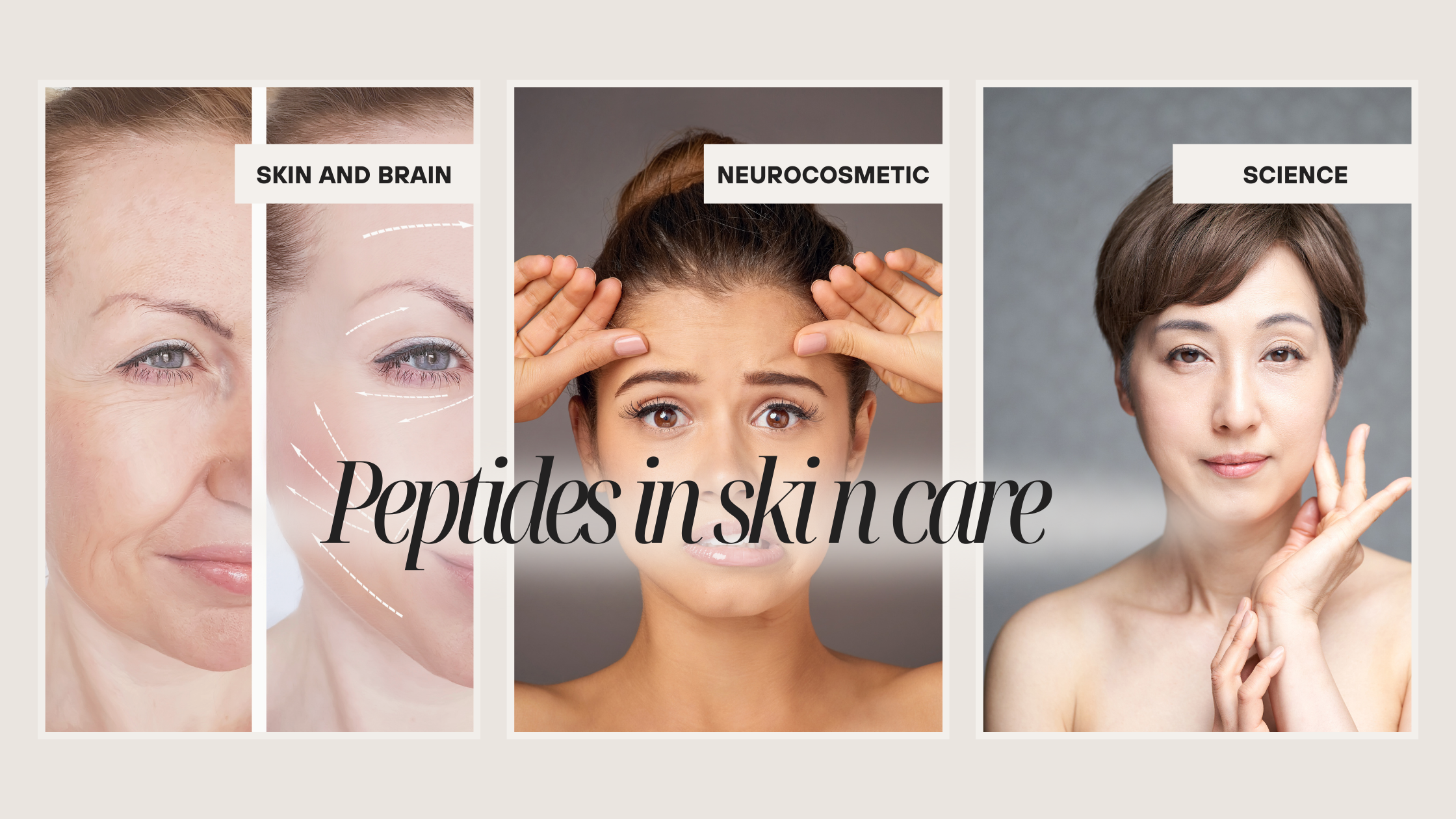In the realm of skincare, where innovation meets tradition, peptides have gained significant attention as a potent anti-aging ingredient. But what exactly are peptides, how do they work, and what does the science say about their efficacy? This blog delves into the fascinating world of peptides, unraveling their role in skincare and the robust scientific evidence that supports their anti-aging benefits.
What Are Peptides?
Peptides are brief sequences of amino acids, usually consisting of 2 to 50 amino acids.They are the building blocks of proteins, which are essential for various biological functions in the body, including the structure and function of skin. In skincare, peptides are used to promote skin health, particularly by stimulating collagen production, which is crucial for maintaining skin's firmness and elasticity.
There are different types of peptides used in skincare, each serving unique purposes:
- Signal Peptides: These peptides, such as Palmitoyl Pentapeptide-4 (commonly known as Matrixyl), signal the skin to produce more collagen, elastin, and other proteins. This can lead to firmer, more youthful-looking skin.
- Carrier Peptides: Carrier peptides, like Copper Peptides, deliver trace elements necessary for wound healing and enzymatic processes. Copper Peptides are known for their ability to promote collagen production and repair skin damage.
- Enzyme-Inhibiting Peptides: These peptides inhibit enzymes that break down collagen in the skin, helping to maintain the skin's structural integrity.
- Neurotransmitter-Inhibiting Peptides: Sometimes referred to as "Botox-like" peptides, these work by inhibiting the release of neurotransmitters that cause muscle contraction, thereby reducing the appearance of expression lines and wrinkles.
Peptides work in skincare by penetrating the outer layer of the skin and sending signals to the cells to perform specific functions. One of the primary roles of peptides is to stimulate the production of collagen a key protein that gives skin its structure and firmness. As we age, the natural production of collagen slows down, leading to wrinkles, sagging, and other signs of aging. Peptides help to reverse this process by encouraging the skin to produce more collagen, resulting in a more youthful appearance.
Beyond collagen production, peptides can also improve the skin's barrier function, reduce inflammation, and enhance skin hydration. These multifunctional properties make peptides a valuable ingredient in anti-aging skincare formulations.
The Science Behind Peptides and Their Anti-Aging Benefits
The effectiveness of peptides in skincare is well-documented in scientific literature. Here, we explore some of the key research findings that highlight the anti-aging benefits of peptides:
- Collagen Stimulation and Wrinkle Reduction:

- A landmark study published in the International Journal of Cosmetic Science investigated the effects of Palmitoyl Pentapeptide-4 (Matrixyl) on collagen production and wrinkle reduction. The study found that this peptide significantly increased the synthesis of collagen and glycosaminoglycans in the skin. After 12 weeks of topical application, participants showed a substantial reduction in wrinkle depth and an improvement in overall skin texture and elasticity. The study concluded that Matrixyl could effectively stimulate collagen production and reduce the visible signs of aging.
- Another study published in the Journal of Cosmetic Dermatology examined the effects of a peptide serum on aging skin. The researchers found that the serum, containing a blend of peptides, improved skin elasticity and firmness, and reduced the appearance of fine lines and wrinkles after just four weeks of use.
- Enhancing Skin Firmness and Elasticity:
- Peptides like Palmitoyl Tripeptide-1 have been shown to improve skin firmness and elasticity. A study published in the Journal of Drugs in Dermatology evaluated the efficacy of a peptide complex in improving skin firmness. The results indicated that the peptide complex significantly enhanced skin elasticity and reduced the appearance of sagging skin. The study emphasized the potential of peptides as an effective solution for aging skin, particularly in maintaining firmness and preventing further sagging.
- Wound Healing and Skin Repair:
- Copper Peptides are particularly noted for their wound-healing properties. Research published in the Journal of Investigative Dermatology demonstrated that Copper Peptides could accelerate wound healing by promoting collagen and elastin production. The study found that Copper Peptides also have antioxidant properties, which help protect the skin from free radical damage. This dual action of promoting healing and protecting the skin makes Copper Peptides a powerful anti-aging ingredient.
- Another study published in Experimental Dermatology highlighted the role of Copper Peptides in skin repair and regeneration. The study showed that Copper Peptides could improve the skin's barrier function and enhance the production of key proteins involved in skin structure, leading to improved skin resilience and a reduction in the signs of aging.
- Hydration and Barrier Function:
- The skin's barrier function is essential for maintaining hydration and protecting against environmental stressors. Peptides like Palmitoyl Tetrapeptide-7 have been shown to strengthen the skin's barrier function, helping it retain moisture and stay hydrated. A study published in the Journal of Dermatological Science found that Palmitoyl Tetrapeptide-7 could reduce inflammation and improve the skin's barrier function, making it a valuable ingredient for aging skin that tends to become drier and more sensitive over time.
- Peptides also support the production of natural moisturizing factors (NMFs), which are essential for keeping the skin hydrated. By boosting the skin's hydration levels, peptides help to reduce the appearance of fine lines and wrinkles, giving the skin a smoother, plumper appearance.
How to Incorporate Peptides Into Your Skincare Routine
Incorporating peptides into your skincare routine can be a game-changer for maintaining youthful, healthy skin. Here are some tips for getting the most out of peptide-based skincare products:
- Choose High-Quality Products:
Look for products that specifically list peptides like Matrixyl, Argireline, or Copper Peptides in their ingredient list. High-quality formulations often combine peptides with other active ingredients like hyaluronic acid, antioxidants, and retinoids to enhance their effectiveness.
- Consistency is Key:
Peptides work best when used consistently over time. Incorporate peptide serums or creams into your daily skincare routine, applying them after cleansing and before moisturizing. Regular use can lead to cumulative benefits, resulting in firmer, smoother skin.
- Pair with Complementary Ingredients:
Peptides can be used in conjunction with other anti-aging ingredients for maximum benefits. For example, pairing peptides with retinoids can enhance collagen production, while combining them with hyaluronic acid can boost hydration and plump the skin.
- Monitor for Results:
While peptides are effective, they may take some time to show visible results. Be patient and monitor your skin's response to the products. Over time, you should notice improvements in skin texture, firmness, and the reduction of fine lines and wrinkles.
Conclusion
Peptides are more than just a trend in the skincare industry they are scientifically proven ingredients with a powerful impact on aging skin. By stimulating collagen production, enhancing skin firmness, promoting wound healing, and improving hydration, peptides offer a comprehensive approach to combating the signs of aging.
As research continues to advance, peptides are likely to remain at the forefront of anti-aging skincare. For those seeking to preserve their youthful appearance, incorporating peptide-infused products into their skincare routine is a wise investment in skin health.
Whether you're just beginning your anti-aging journey or looking to enhance your existing routine, peptides offer a promising path to healthier, more resilient skin. With the backing of scientific research, you can feel confident in the effectiveness of peptides as a key component of your skincare arsenal.
References
- Lintner, K., & Peschard, O. (2000). Biologically active peptides: From a laboratory bench curiosity to a functional skin care product. International Journal of Cosmetic Science, 22(3), 207-218.
- Robinson, L. R., Fitzgerald, N. C., Doughty, D. G., Dawes, N. C., Berge, C. A., & Bissett, D. L. (2005). Topical palmitoyl pentapeptide provides improvement in photoaged human facial skin. International Journal of Cosmetic Science, 27(3), 155-160.
- McDaniel, D. H., Farris, P., & Valacchi, G. (2018). Atmospheric skin aging-Contributors and inhibitors. Journal of Drugs in Dermatology, 17(4), 425-431.
- Pickart, L., & Thaler, M. M. (1973). Tripeptide in human serum which prolongs survival of normal liver cells and stimulates growth in neoplastic liver. Nature New Biology, 243(128), 85-87.
- Goldstein, L. J., & Krull, E. A. (2002). Peptides for treatment of wrinkled skin. Journal of Cosmetic Dermatology, 1(1), 27-34.
- Korting, H. C., & Schäfer-Korting, M. (2010). Carriers in the topical treatment of skin disease. Journal of the American Academy of Dermatology, 62(6), 103-110.

